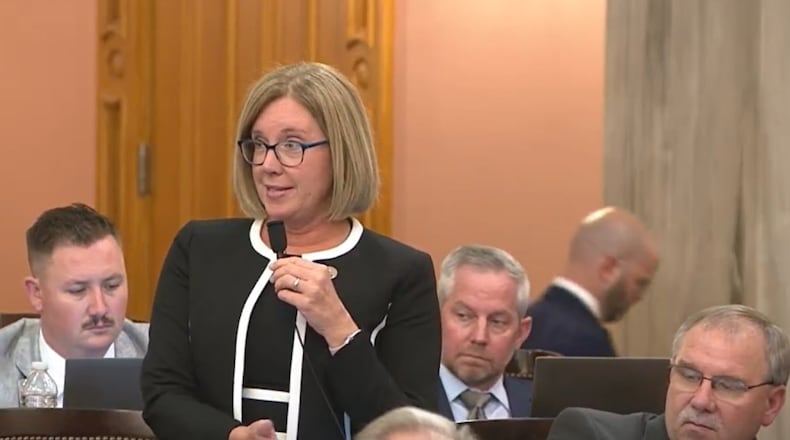“The Richard Strauss matter was an unthinkable tragedy that greatly affected citizens of Ohio, who we have a duty to protect,” said State Sen. Bob Hackett, R-London in his sponsor testimony for the bill, which passed the Ohio Senate on April 24.
Strauss committed 1,430 instances of fondling and 47 rapes during his tenure, according to a 2019 campus safety report from OSU. Strauss worked as a university physician from 1978 to 1998. He died by suicide in California in 2005.
S.B. 109 updates the criminal code to hold doctors to the same standards as other professions, Hackett has previously said. It also gives the State Medical Board of Ohio more tools to hold medical practitioners accountable.
“We have a duty to protect Ohioans,” said State Rep. Cindy Abrams, R-Harrison during Tuesday’s Ohio House session.
The bill protects vulnerable individuals, upholds ethical standards and promotes public safety, said State Rep. Latyna Humphrey, D-Columbus in support of S.B. 109.
The bill expands the definition of sexual battery by adding licensed medical professionals to the list of types of offenders such as teachers, coaches and mental health professionals already contained in the sexual battery statute.
The bill adds sexual contact to the existing provision in the sexual battery statute to include inappropriate sexual touching.
S.B. 109 also increases accountability for those who are aware of these crimes but fails to report them.
A survivor of sexual abuse submitted testimony to the Ohio House Criminal Justice Committee about what he said happened to him and how, when he told other medical providers at the same office, they did nothing.
“In 1996...I was molested by my medical provider at the age of 10,” said Jeff Kohler, a 2012 OSU grad, lifelong Ohioan and military veteran. Kohler said the incident happened in Canton.
“On Aug. 1, 2000, I reported the sexual abuse I experienced to three medical providers at this same address, however I never spoke to any police officers, any mental health providers. I was merely told, ‘sorry this happened to you, it will never happen again,’” Kohler said.
Kohler described the ordeal he went through as an adult trying to report this incident to law enforcement and state licensing boards, saying he wanted to protect other patients from the alleged offender. Law enforcement never filed any charges against the medical provider, he said.
“My hope is that the next boy who reports being molested will be believed, and that the medical board will investigate the matter, and be more open and transparent. That they will not have to face the same hurdles and gaslighting I did,” Kohler said.
S.B. 109 expands the offense of failure to report a crime by prohibiting any person who knows that a licensed medical professional has committed a sex offense against the medical professional’s patient from failing to report such knowledge to law enforcement authorities within a 30-day period, the bill analysis says.
The bill prohibits doctor-patient confidentiality being used as means to exclude evidence against the medical professional in court proceedings.
About the Author


